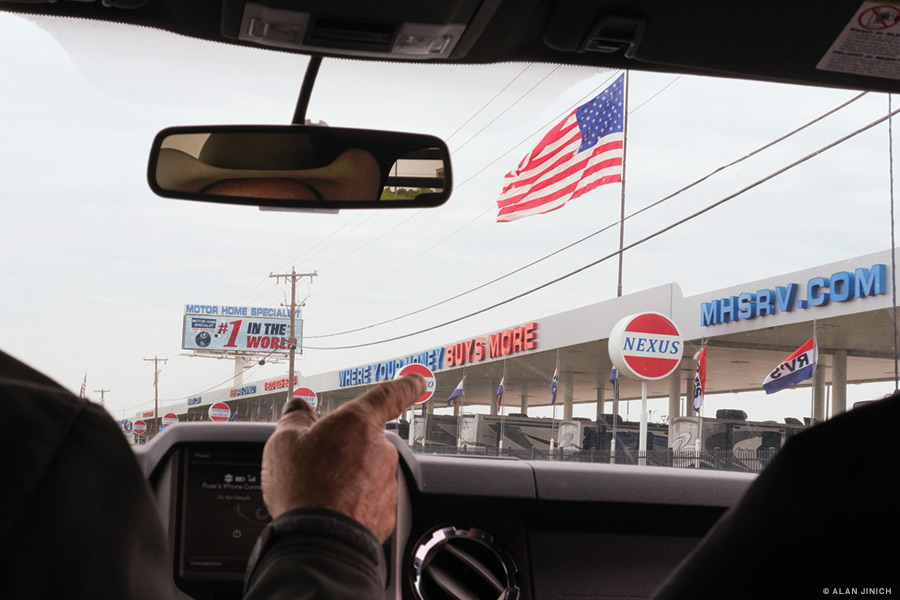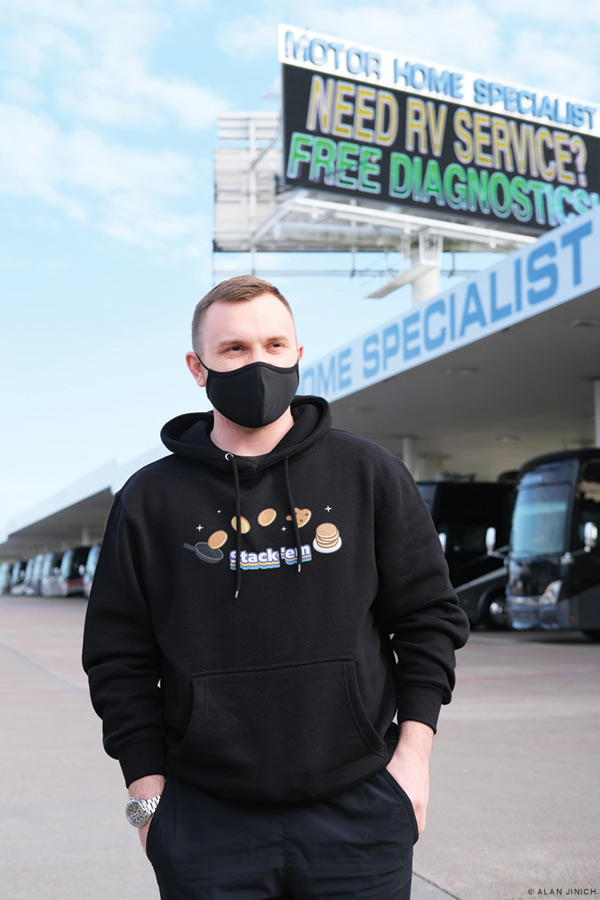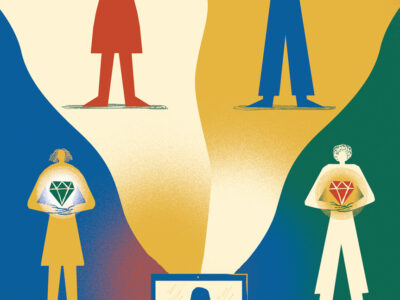
A 7,000-mile circuit around the country seeking answers to a question about to loom over me.
By Alan Jinich
We turn off US Route 67 into a behemoth of a parking lot. Behind a gate marked “Shepherd’s Valley,” thousands of empty asphalt spaces align in mesmerizing symmetry. If I were still in elementary school, this would be my dream recess blacktop—a stage to set my world record for largest chalk drawing of the solar system. Yet I still feel hesitant about this spontaneous approach to the Shepherd’s Valley Cowboy Church.
What are two northeastern college kids doing here, in the middle of the spring semester, in Alvarado, Texas? We’re not really sure, either. It’s Day 12 of our six-week road trip across the country—starting in our home state of Maryland and looping through … Wyoming? Arizona? We’re taking things day by day. It’s been one year since the start of the pandemic and, like most of our peers, we’ve grown tired of Zoom classes and our rooms’ stale ventilated air. Having had the good fortune to be vaxxed, we felt an urge to get into a car and just drive. To meet other people again, face to face. We wanted to understand what this all means for our generation—not from infographics and survey results, but from young people themselves.
I grab my recording gear and we head toward the entrance, whose glass doors reflect a clear April sky. The church looks like a warehouse from the outside, but it’s homey on the inside, ornamented with cowboy hats and saddles, steer heads, and vintage rodeo photographs. We’ve already done nearly 30 interviews by this point, but I remain anxious about approaching strangers. Max, my partner in this project, is more confident in taking the lead, so he walks up to the receptionist and gives the usual spiel.
“Hey, I have a super random question for you,” he says, launching into the pitch for our oral history interviews of 18- to 25-year-olds adapting to the pandemic. He makes it through the awkward windup to land on his final line: “I promise we’re not plotting to kidnap you.” That sometimes breaks the ice.
The receptionist redirects us to Pastor Russ, a grandfatherly man who introduces himself with a firm handshake and slit-eyed smile. Only his upper teeth show. “How do you do, boys?” he says. Wearing blue jeans, leather boots, and a cowboy hat, he looks the part, but his voice is higher than I expected.
We start chatting about the church as he leads us through the lobby to an enormous, covered rodeo arena with bright red stadium seating. American flags dangle from the rafters and the railings. The whole getup looks like something lifted out of a 10-year-old’s Sunday school daydream. I can imagine a young roper chasing down a steer along the ground floor’s oval edge: in my own daydream, a silver cross dangles down his neck as he tosses a spinning rope and yanks at the steer’s chest.
“I don’t have any straight fingers,” Pastor Russ tells us. “There’s a lot of guys that lose their fingers team-roping. They just pop right off and shoot in the air. Zip, they’re gone! You can hear it, it’s pretty gross.” I ask to photograph his hands as he tells us about his collegiate roping career. Since the rodeo cowboys didn’t have a church to attend while traveling, he’d round up the other competitors, knocking door to door, and lead his own services. “In the three years we ended up going to college finals, we had 42 kids make commitments to live for God. And that just started everything.”
Now he presides over a complex that runs from multipurpose rooms capable of hosting chapel session and Sunday school, to the main arena itself, which could double as a rock concert venue. Soon we’re back on the highway in Russ’s horsebox-hauling pickup truck. He’s offered us lunch at a Mexican restaurant a few miles down the road. When our burritos arrive, he leads grace and in different accents we say “Amen.” We talk about our families and our career indecisiveness, and then the conversation shifts to the pandemic. Pastor Russ puts down his plastic fork and gazes into the empty space between our heads.
“The one thing that really concerns me the most is the age group we’ve lost, exactly the age group y’all are looking at,” he says. “Everybody I know that’s doing church stuff is really concerned about it—because we’re missing the next generation of leadership.” He emphasizes that we’re at the age where people decide whether to pursue church life as an enduring vocation. “I don’t want them to miss out on some of this stuff.”
On our way back to the church, staring out the window, I see an enormous American flag waving in the distance.
Pastor Russ points toward it with his crooked finger. “The biggest RV dealership in the country. You should go check it out.”
So we do, and it happens to be a perfect location for an interview: RV sales are skyrocketing, as the whole country seems to be fantasizing about the same long Texas roads that brought us here. We end up meeting a salesman named Grayson, the only employee under 25. The glass door of his cramped office is so thin we can hear the neighboring salesman shout into his landline. Grayson, on the other hand, is calm and reserved—but very much on the make.

I imagine Pastor Russ sitting in the corner with his hands clasped. He’d surely be impressed by Grayson’s confidence and entrepreneurial spirit. The pandemic has been good to Grayson. He’s made six figures selling RVs and cryptocurrency, and produces YouTube videos on the side for an online community of investors. I thought I had left the Penn bubble behind, but Grayson might as well be a Wharton senior transplanted to central Texas. I wonder what Russ would think about Grayson’s lucrative ambitions and his faith in Bitcoin—a volatile, unpredictable string of digital code that gives him confidence in the future.
Driving away from Alvarado, I skim through my camera roll and land on Grayson’s portrait in the dealership lot. His black mask and crypto-themed sweatshirt capture the pandemic dynamics we set out to document, but the deeper current running through today’s conversations suggests a truth that doesn’t really change from one generation to the next. An eclectic pastor told us his life story, and pointed us in the direction of an earnest young salesman whose path could hardly have been more different—except that he, too, had discovered a career path at the same age: my age.
And so what about me? This trip, spurred by Zoom fatigue and wanderlust, is meant to take stock of a generation emerging precariously in adulthood. But maybe, underneath the surface, it’s really about taking stock of myself—and finding a purpose of my own, somewhere between the murky Georgia lakes and Teton snow. I doubt it’ll be Bitcoin or Christian evangelicalism. But before too long I will have to choose something, or let something choose me. For now, my camera feels good in my hands. The afternoon sun warms my neck. I have nowhere to be but the open road.
Alan Jinich is a College senior. The oral history project he carried out with classmate Max Strickberger lives at generationpandemicproject.com.




